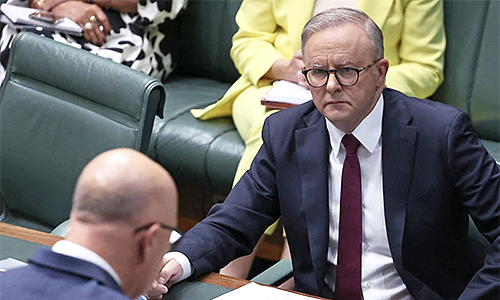The riots that have erupted across Britain in the last week have been reported extensively in France. The centre-right Le Figaro describes a ‘whiff of civil war’ in the air. The French media are well-versed in covering riots of their own, but the trouble on the other side of the Channel is unusual in that the troublemakers are regarded as far-right.
The violence that has been a regular feature in French streets in recent years comes from elsewhere. Far-left mobs regularly smash up shops and banks and battle the police, and last summer, there was a week of rioting across France after a teenage French-Algerian driving without a licence was shot dead by police.
Football hooliganism in France has nowhere near the same history or scale as in England
But what France hasn’t seen for years is any comparable violence from the far-right. In the 1980s and 1990s, there were regular street demonstrations organised by a variety of far-right organisations, most of which were anti-Semitic and nostalgic for the Vichy regime of the Second World War.
Far-right groups still exist in France, and very occasionally they take to the streets dressed in black leather and waving flags with arcane insignia. One such march in Paris earlier this year caused outrage among the left. ‘It’s unacceptable to have allowed 500 neo-Nazis and fascists to parade in the heart of Paris,’ said Socialist party senator David Assouline.
In response, the Paris police department explained that they could prohibit a march only if it was a risk to law and order. ‘Given that this demonstration had not caused any problems or public order issues during previous years, the Paris prefect was not in a position to take steps to ban it,’ they said.
The fantasy of the French establishment, still dominated by the bourgeois left that emerged from the protests of 1968, is that the ‘fascists’ are just waiting for their moment to launch a putsch.
Were this true, the far-right would have risen up after one of the many Islamist terrorist attacks of the last decade. France has suffered more than any other European nation – from the massacre of the Charlie Hebdo staff to the mass casualty attacks in Paris and Nice, not forgetting the barbaric slaying of teachers, police officers and priests – and yet there has never been a violent retaliation from the far-right similar to the scenes in England in recent days.
There was a brief confrontation last November in the southern French town of Romans-sur-Isère. A 16-year-old boy called Thomas had been stabbed to death at his village dance, allegedly by a gang who gatecrashed the evening looking to ‘kill a white’. Some far-right thugs then went looking to exact revenge on the estate where they believed the gang lived, but police soon dispersed them.
That was the end of the trouble, but the manner of Thomas’s death was not forgotten. In last month’s parliamentary election, the constituency in which the murder occurred elected an MP from Marine Le Pen’s National Rally party; two years earlier, 62 per cent of the same voters had cast their ballots for the centre-right Republicans.
Is this why France hasn’t experienced in recent years any rioting from people angry and alarmed by mass immigration and insecurity? Opinion polls in the last year have shown that similar numbers of French and British – approximately two-thirds – believe their governments have failed to control immigration. In France, however, people express their discontent at the ballot box; 1.5 million people voted for Marine Le Pen’s party in the 2017 election, a figure that had risen to 3.5 million in 2022. In last month’s election, she received 10.1 million votes, or 37 per cent of the electorate.
There may be other factors why there have been no real violent protests. It is reported that the English Defence League (or an offshoot) is implicated in some of the rioting; this is an organisation whose history is linked closely to football hooliganism. Between 30 to 40 per cent of EDL members are believed to be football hooligans who enjoy physical violence.
Football hooliganism in France has nowhere near the same history or scale as in England. What little there is often comes from the extreme-left; in 2022, a group of Bordeaux hooligans beat up a parliamentary candidate from the National Rally when they spotted him in the street.
In recent years, the term ‘far-right’ has been used too often. The European Union draws a distinction between the far-right, which it defines as violent extremists working to bring down democracy, and the ‘radical right’. Radicals believe ‘democracy should be maintained [but] the ruling elites must be replaced’.
The majority of Le Pen’s voters fit the radical right description. They hate the ruling class, and the ruling class hates them. In last month’s parliamentary election Macron’s centrists hastily concocted a coalition with the left – including communists, anti-Semites and Antifa extremists – in order to keep Le Pen from power. Their ploy worked even though the National Rally still won the popular vote and has the most seats of any single party in the National Assembly.
Now this same centrist-left coalition has stated its intention to shun the National Rally in parliament. Lucie Castets, the unelected Parisian technocrat who is the left’s choice for prime minister, said in a recent interview she would ‘never’ work with the National Rally.
This is risky. If the ten million French who voted for Le Pen feel their voice counts for nothing to the prime minister, some might resort to other methods to make themselves heard.









